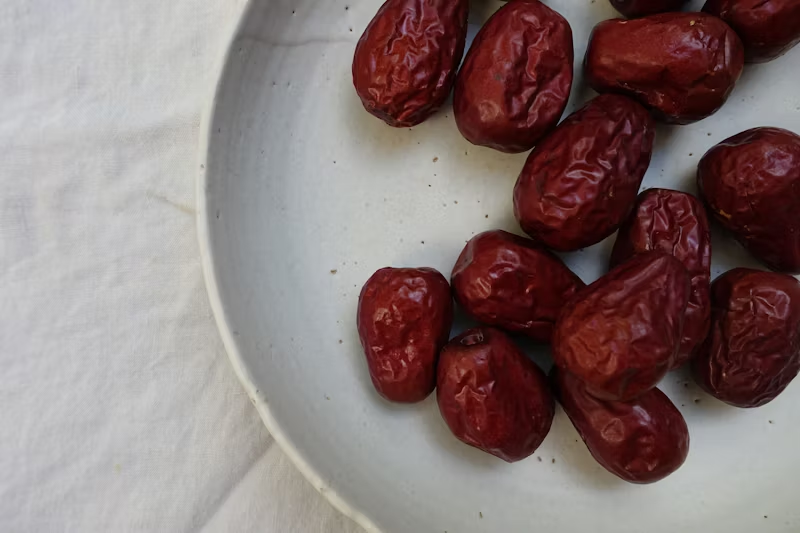Jujube: Superfruit Health Benefits Revealed
Jujube fruits are high in vitamin C and antioxidants, which may help boost immunity and protect against cellular damage. These nutrient-dense fruits also contain compounds that could improve sleep quality, support digestive health, and even enhance brain function.

Jujube fruit, also known as Chinese dates, has been used for centuries in traditional medicine for its potential health benefits. This small, sweet fruit packs a nutritional punch, offering a rich source of antioxidants, vitamins, and minerals.
Jujube fruits are high in vitamin C and antioxidants, which may help boost immunity and protect against cellular damage. These nutrient-dense fruits also contain compounds that could improve sleep quality, support digestive health, and even enhance brain function.
While jujubes can be enjoyed fresh, they are often dried and used in various culinary applications. The dried form concentrates the fruit's natural sugars, making it a sweet and chewy snack. However, it's important to note that the drying process also increases the calorie content, so moderation is key when consuming dried jujubes as part of a balanced diet.
Nutritional Profile and Health Advantages of Jujube
Jujube fruit offers a rich array of nutrients and potential health benefits. This small fruit packs a powerful punch in terms of its nutritional value and positive effects on digestive and mental health.
Vitamins and Minerals Contents
Jujubes are an excellent source of vitamin C, providing a significant boost to the immune system. They also contain important minerals such as potassium, iron, calcium, and phosphorus. These nutrients contribute to various bodily functions, including bone health and muscle function.
The fruit is rich in antioxidants, which help protect cells from damage caused by free radicals. Jujubes contain polysaccharides, saponins, and triterpenic acids, compounds known for their potential health-promoting properties.
A 100-gram serving of fresh jujubes provides:
- Vitamin C: 69 mg
- Potassium: 250 mg
- Iron: 0.48 mg
- Calcium: 21 mg
Benefits for Digestive Health
Jujubes can positively impact digestive health due to their fiber content. Fiber aids in promoting regular bowel movements and preventing constipation. This can contribute to overall gastrointestinal health and comfort.
The fruit's natural compounds may also help soothe the digestive tract. Some studies suggest that jujube extracts can protect the lining of the stomach and intestines, potentially reducing the risk of ulcers.
Jujubes are often used in traditional medicine to alleviate digestive issues. Their mild laxative effect can help maintain a healthy digestive system when consumed as part of a balanced diet.
Impact on Mental Well-Being
Jujubes have been used for centuries in traditional medicine to improve sleep quality and reduce anxiety. The fruit contains compounds that may have a sedative effect, potentially helping those struggling with insomnia or stress-related sleep disturbances.
Research suggests that jujube extracts may increase serotonin levels in the brain. Serotonin is a neurotransmitter that plays a crucial role in mood regulation and sleep patterns.
The calming properties of jujubes can also help in managing stress and anxiety. While more research is needed, preliminary studies indicate that regular consumption of jujube fruit or its extracts may contribute to improved mental well-being.
Jujube in Traditional and Modern Uses
Jujube fruit has a long history of culinary and medicinal applications. Its versatility and health benefits make it a valuable ingredient in both traditional and contemporary contexts.
Culinary Applications
Jujube fruit is used in various culinary preparations. Fresh jujubes can be eaten as a healthy snack, offering a crisp texture and sweet flavor. Dried jujubes are popular in candies, teas, and jams.
In Asian cuisines, jujubes are often added to rice dishes and soups for flavor and nutritional value. The fruit can be made into juice or incorporated into baked goods like breads and cakes.
Jujube's natural sweetness makes it an excellent sugar substitute in recipes. Its versatility allows for creative uses in both sweet and savory dishes, providing a unique flavor profile and nutritional boost to meals.
Therapeutic Roles in Medicine
Jujube has been utilized in traditional Chinese medicine for centuries. It is believed to support liver health, boost immunity, and improve digestion. Modern research has begun to validate some of these traditional uses.
Studies suggest jujube may have anti-inflammatory properties and contain bioactive compounds that fight free radicals. The fruit's high vitamin C content may help support the immune system and aid in iron absorption, potentially beneficial for those with anemia.
Jujube extract has shown promise in improving sleep quality and enhancing memory function. Some research indicates potential benefits for heart health and blood sugar management, though more studies are needed to confirm these effects.
Want more posts like this?Sign up for our FREE newsletter →